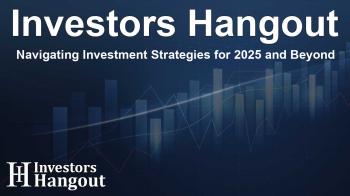Navigating Investment Strategies for 2025 and Beyond

Investment Insights for 2025
In a world emerging from globalization, the way we invest needs a thoughtful reevaluation. Market opportunities now require us to navigate a complex landscape marked by changing trade dynamics and economic pressures.
Understanding Market Dynamics
T. Rowe Price, a dominant player in global asset management and a prominent name in retirement investment strategies, emphasizes the importance of awareness regarding shifting trends shaped by economic policies. This midyear outlook for 2025 highlights several core factors influencing the market.
Economic Challenges Ahead
Currently, various pressures affect the global economy. The aftermath of trade wars poses serious ramifications, potentially leading to a slowdown. In particular, observers note that fiscal and tax policies in the United States are likely to influence market behaviors significantly. As a result, businesses could face climbing operational costs, which may squeeze consumer spending ability.
Equity Market Shifts
Market analysts foresee a widening of equity options. This trend suggests a reduced reliance on just U.S. stocks and mega-cap technology companies, paving the way for a more diverse portfolio that includes value stocks and selected emerging markets. Such diversification can create more investment avenues.
Fixed Income Perspectives
As we navigate 2025, significant transformations within fixed-income investments are noteworthy. Notably, developed markets, particularly the U.S., are grappling with inflation levels exceeding expectations. This indicates a potential downturn for corporate bonds, which traditionally displayed resilience, reframing them as defensive instruments amid economic uncertainty.
Multi-Asset Strategies
T. Rowe Price aims for strategic adjustments within its multi-asset portfolios, emphasizing inflation protection alongside equity diversification. Options like inflation-protected bonds and real asset investments are gaining prominence as effective strategies against projected inflation levels.
Despite the current uncertainties in markets characterized by heightened interest rates and fluctuating economic conditions, there remains a space for both active and passive management approaches. Nevertheless, it appears that active management may have the upper hand in outperforming the sector.
Expert Insights on Current Trends
Blerina Uruçi, T. Rowe Price’s chief U.S. economist, notes the transforming effects of tariffs, warning that the U.S. and the world will face disturbances in supply and demand as trade negotiations evolve. Uncertain futures await both economies, which may experience disappointing growth rates, impacting global dynamics.
Josh Nelson, head of Global Equity, acknowledges the evolving investment landscape, indicating an expansion of viable investments in the aftermath of recent trade policies. He advocates for diversification to harness opportunities across sectors and geographical regions, distancing oneself from past market restrictiveness.
Ken Orchard, head of International Fixed Income, reflects on the precedents being transformed by current trade policies and fiscal initiatives. With increasing recessionary signals, especially led by the U.S., the reality seems to point towards prolonged modest growth, alongside inflationary pressures.
Tim Murray, Capital Markets strategist, advises that the focus during turbulent geopolitical periods should pivot towards asset class valuations. Current market dynamics hint at a favorable horizon for non-U.S. equities, diverging from traditional investment trends.
About T. Rowe Price
T. Rowe Price, established in 1937, aims to assist investors in achieving their long-term objectives. Known for exceptional asset management and commitment to client-centric values, the company has garnered trust worldwide. As of the latest reports, T. Rowe Price administers USD $1.56 trillion in assets.
The firm offers insights and updates through various social platforms, ensuring continual engagement with followers and clients. Their focus remains on facilitating informed investment decisions across markets.
Frequently Asked Questions
What is the main focus of T. Rowe Price's 2025 outlook?
The 2025 outlook underscores the significance of adapting to a more diversified market landscape and addresses the implications of economic challenges like deglobalization.
How is T. Rowe Price adapting to current market conditions?
The company emphasizes multi-asset strategies that prioritize inflation protection and equity diversification to navigate today’s financial challenges.
What economic factors are influencing the investment landscape?
Factors include trade wars, evolving fiscal policies, and shifts in consumer purchasing power, all of which contribute to market complexity.
Are both active and passive management viable in today’s market?
Yes, while both have roles, active management is positioned to perform strongly in this challenging environment characterized by volatility and policy uncertainty.
How does T. Rowe Price view international investments?
The firm advocates for a broader perspective on investments, encouraging diversification that extends beyond U.S. equities to include emerging markets and value stocks.
About The Author
Contact Henry Turner privately here. Or send an email with ATTN: Henry Turner as the subject to contact@investorshangout.com.
About Investors Hangout
Investors Hangout is a leading online stock forum for financial discussion and learning, offering a wide range of free tools and resources. It draws in traders of all levels, who exchange market knowledge, investigate trading tactics, and keep an eye on industry developments in real time. Featuring financial articles, stock message boards, quotes, charts, company profiles, and live news updates. Through cooperative learning and a wealth of informational resources, it helps users from novices creating their first portfolios to experts honing their techniques. Join Investors Hangout today: https://investorshangout.com/
The content of this article is based on factual, publicly available information and does not represent legal, financial, or investment advice. Investors Hangout does not offer financial advice, and the author is not a licensed financial advisor. Consult a qualified advisor before making any financial or investment decisions based on this article. This article should not be considered advice to purchase, sell, or hold any securities or other investments. If any of the material provided here is inaccurate, please contact us for corrections.

